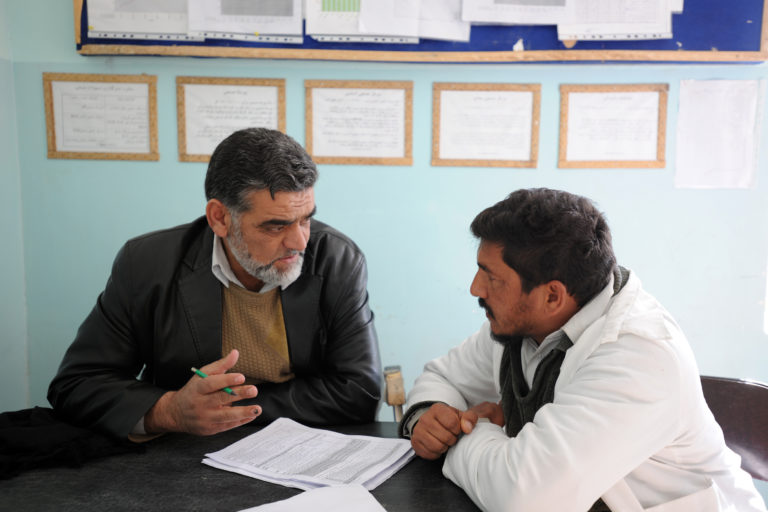
Completing an inspection checklist sent out by the Afghan Basic Package of Health Services, Farah Hospital pharmacist Nasrullah Noori speaks with Dr. Fazil Ghani, the resident doctor at the clinic, during a clinic assessment, Dec. 29, 2009. The clinic employs 14 staff members, including civilian guards, one doctor, one nurse, one midwife, a pharmacist and other administrative officials, and is open 24 hours a day. There is always a doctor here, said Mohammad Sarwar, an administrative professional at the clinic who has been in charge of the clinics logistics for the past three years. Noori travelled to the clinic in the Pusht Rod District of Farah Province, Afghanistan, with the Farah Provincial Health Director, Dr. Abdul Jabar, and other Farah Hospital medical providers; all of which were transported and accompanied by members of the Farah Provincial Reconstruction Team (PRT). Image by ISAF Media.
An App That Tracks Your Spiritual Health
The faded Jiffy Lube sticker in the upper left hand corner of your car windshield recommends another oil change at 48,300 miles or in February 2013, whichever comes first. A quick glance at your odometer (61,876) and iPhone (May 9, 2014) indicates that you’re just a tad behind schedule. This is not the first time — and probably not the last — when a well-intentioned reminder will go unheeded.
This likely won’t be the case, however, for those who sign up to receive twice-daily texts from SoulPulse.org, a combined web site and real-time research project designed to track the role of spirituality in the lives of every-day Americans and its links to various aspects of well-being, including health.
The concept is simple. Participants receive two text messages a day asking them to describe what’s going on in their life at that very moment. Are you feeling thankful? Grateful? Sleepy? Loving? Divinely inspired? At the end of 14 days they receive a report that tracks their spiritual ups and downs, which, in theory, should help improve their habits, not to mention their mental and physical well-being.
Kyndria Brown, a bookkeeper from Connecticut and SoulPulse participant, said in an AP article that she thought more about God when she was alone and feeling sad. “But when I was with other people I tended to not think in a spiritual way.”
Encouraging participants to pay attention to such attitudes in context — noting specific activities or patterns of thought that draw them closer or further away from spiritual mindedness – adds a layer of practicality not seen in similar surveys that simply ask if an individual considers themselves spiritual or not. Even better, it will likely provide them with more than a merely theoretical understanding of the link between better thoughts and better health.
But what about those who don’t sign up with SoulPulse? Is there anything besides the occasional text message to remind the rest of us when to check in mentally, to keep track of those less helpful modes of thinking that may be preventing us from enjoying happier and healthier lives and contributing to the health and happiness of those around us?
One possible alternative offered up by 19th century health reformer, Mary Baker Eddy, is to consider whether the thoughts we entertain about ourselves and others are divine or human, spiritually uplifted or laden with fear. “That is the important question,” Eddy wrote in her primary work on spirituality and health.
Considering the period in which this was written, it can be assumed that such a level of mental engagement might be achieved by something other than technological intervention.
While the sticker in our windshield may fade and peel away, the persistent desire for self-improvement never subsides. Whether this desire is awakened by a text message or a humble prayer to see things from a higher, more spiritual perspective, the effect is the same, and we begin to see that such improvement is really no more than a thought away.
